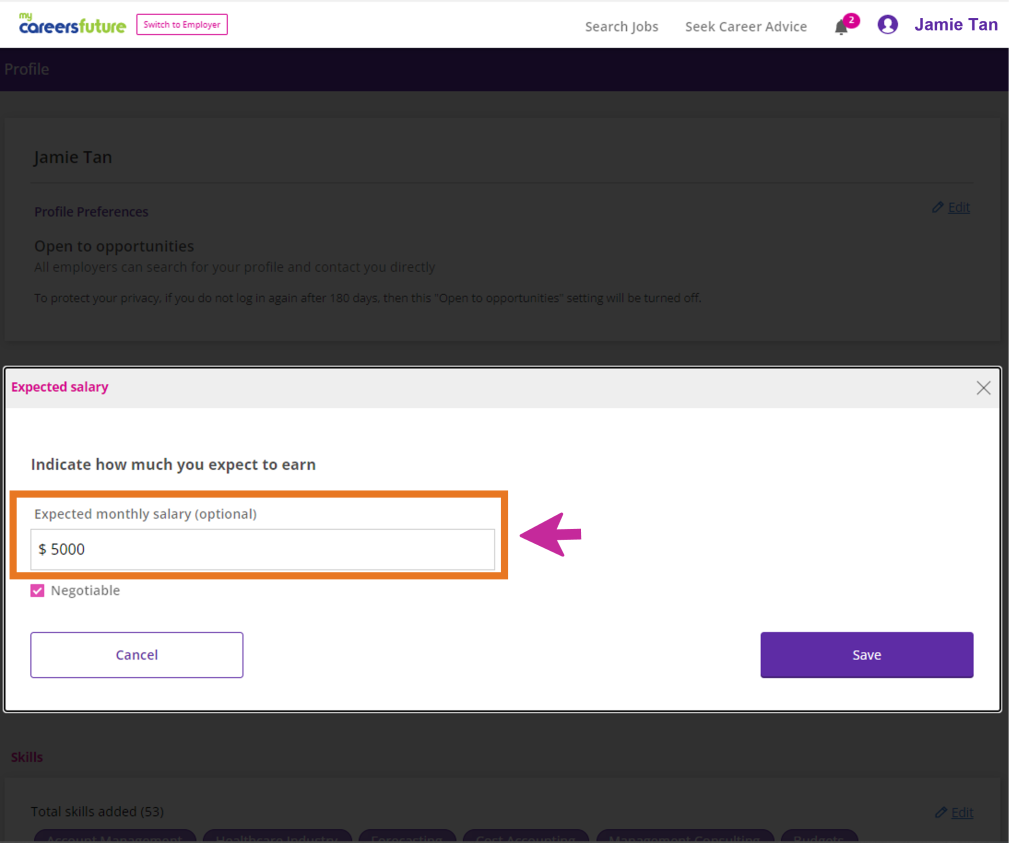Now that the graduation dust has settled, it’s time to focus on getting that first job! You may have been diligently scouring job portals, looking at job posts, shortlisting the ones you’re keen on, and submitting your application.
Perhaps, you have even received replies from some companies inviting you to come for an interview!
Now, you’re thinking: I’ve got this. Land the job and roll in the dough. That starting pay you have in mind begins flashing in your mind.
You’re probably already thinking about what you’re going to buy with your first salary.
But what if the potential employers offer you a salary that’s below your expectation?
To negotiate or not to negotiate?
Most recent fresh graduates may believe that they don’t have the negotiating power because of their lack of experience going into a first job offer.
As a fresh jobseeker trying to make headway into the workforce, you may ask:
“What if they decide not to hire me because I asked for more?”
Resolving this question can be pretty tricky. First of all, you’re not sure when, how, or how much to ask for.
Secondly, if done wrong, you may be portraying a less favourable image of yourself.
However, this does not mean that you’re at the mercy of employers.
Every jobseeker has the right to seek fair compensation and you can increase the odds of getting fair remuneration if you know how to negotiate effectively.
Great, so how do I negotiate?
Effective negotiation requires you to do some homework if you want to convince your potential employer to agree with your appeal.
Simply exclaiming something like, “Because I’m worth the money!” certainly isn’t going to work.

You need to be able to rationalise why you’re asking for more than what’s being put on the table.
Here are some tips to guide you along.
How much is the right amount?
Perhaps you may be wondering: What’s the right amount of salary for me? To start negotiations, you’ll first need to have a figure in mind.
Getting an answer to this question will require you to research the market salary of the job you’re gunning for.
This way, you don’t overprice yourself out of the market. Ask the following questions:
- What is the salary range for the job according to industry standards?
- What is the salary range the company is likely to offer for this position?
- What makes me worth a higher salary?
If you’re still unsure of who to pose your questions to, below are some of our recommendations.
And oh, we’ve even rated each resource for you!

1. Your own network
As they are accessible and have your interests at heart, a good place to start your inquiries is with your own family, friends and school alumni members.
Identify those who are currently working or have professional experience in the company or sector that you’re interested to join.

Note: You may even get “bonus” information from them even if you didn’t ask for it!
2. Career-related websites
Websites such as Glassdoor and Salary.sg provide salary information for various jobs.
The former collects salary information from anonymous contributors, while the latter works as a resource site for jobs and wealth accumulation.
However, if you’re looking for an online platform that not only provides the salary range information of jobs but also recommends jobs based on your skillset, you have to check out the MyCareersFuture jobs portal!
Check out how it works in the video below:
The MyCareersFuture jobs portal even enables jobseekers to input their expected salary and recommend jobs with a salary range within the expected figure.
Update your expected salary straight in your MyCareersFuture profile and make potential employers aware of your expectations from the beginning!


3. Career GRIT platform
While most career sites focus on simply showing you job listings, Career GRIT helps guide you to select the right career service you need, with a simple self-assessment about where you are on your job search journey!
Through Career GRIT, you can sign up for career advisory sessions and engage the help of a career coach to help you kickstart a new career!

Note: An all-in-one platform to help you with any career-related matters. Can’t get any better than that!
Salary negotiation during the job interview
After deciding on the salary range that you’re comfortable with for the job you’re applying for, you can feel more confident attending the job interview.
The negotiation process is a build-up of carefully planned steps, leading to the moment where you ask the employer for a salary increase.
Step 1:
Seize this opportunity to raise your worth in the employer’s eyes by highlighting your strengths, talents, knowledge, accomplishments, and skills.
In lieu of work experience, don’t be shy to emphasise previous school projects you’re proud of that are related to the job scope.
For clarity and to make a better impression, verbalise words or phrases such as “took charge,” “initiated,” developed” or “implemented” to indicate the successful completion of a programme or activity.
Step 2:
Usually, the employer may enquire about your asking salary towards the end of the interview.
You can breathe easier here because an employer would not even be asking this question if they think that you’re not a potential hire.
At this moment try not to be the first to mention money so as not to short-change yourself by inadvertently revealing a low salary expectation.
Simply state that you are open to negotiation and willing to consider a competitive offer.
Read more: 5 Tough Interview Questions and How to Tackle Them Effectively
If the employer insists on more specific information, provide a salary range rather than a definite number.
The less you divulge about what offer will make you bite, the more you’re likely to receive the best offer.
Below is an example of a salary offer and your possible responses to it.
Experts suggest framing your response in question form to avoid sounding arrogant or demanding. Some examples would be as follows:
“I am very interested in the position, and I think I could also apply my graphic design skills to the company’s marketing campaigns. Does the salary range of $3,200 to $3,500 work for you?”
or
“I am very keen on the position and contributing to the company’s digital marketing efforts with my creative copywriting for social media. Does a salary range of $3,200 to $3,500 sounds fair for this role?”

If the employer can accept the salary range, very often, there will be no further questions, and the interview will come to a close.
The opposite of this would be a scenario where the employer informs you that they are unable to meet the salary range you mentioned.
They may also share their best offer with you.
Should the offer be less than you expected, refrain from declining the job on the spot.
Instead, reply with a polite and neutral answer that allows further changes to occur between the interview day and the day you receive your interview result.
An example of this would be:
“Thank you for letting me know the salary for this position. I would still like to be considered for this job. I look forward to receiving the result of my application.”
Step 3:
If you receive a job offer in the coming days or weeks, take this opportunity to clarify the company’s other fringe benefits, such as bonuses, incentives, leaves and more, depending on the package offered to you.
If the job offer comes with a salary within the range of what you brought up during the interview, proceed to accept the offer.
However, if it falls short, you may politely reply to enquire about the range that you proposed earlier.
You may also put in writing some of the skills you possess that would add value to the company.
If the employer replies that they’re unable to meet your asking range, refrain from further negotiations or arguing.
Instead, thank them for taking the time to consider. It’s time to make a decision.
A good starting pay is not everything
While getting good starting pay is ideal, keeping your expectations in check and remembering that monetary remuneration should not be your only consideration in looking for a job is important.
Read more: Finding the Right Job Fit? Know Your Work Personality First
There are many other factors that play an important role in determining your satisfaction and happiness at work.
It is also critical to consider your job fit, which includes factors such as your working style, the work arrangement, and your ideal workplace culture, just to name a few.
Good luck with your job search!















